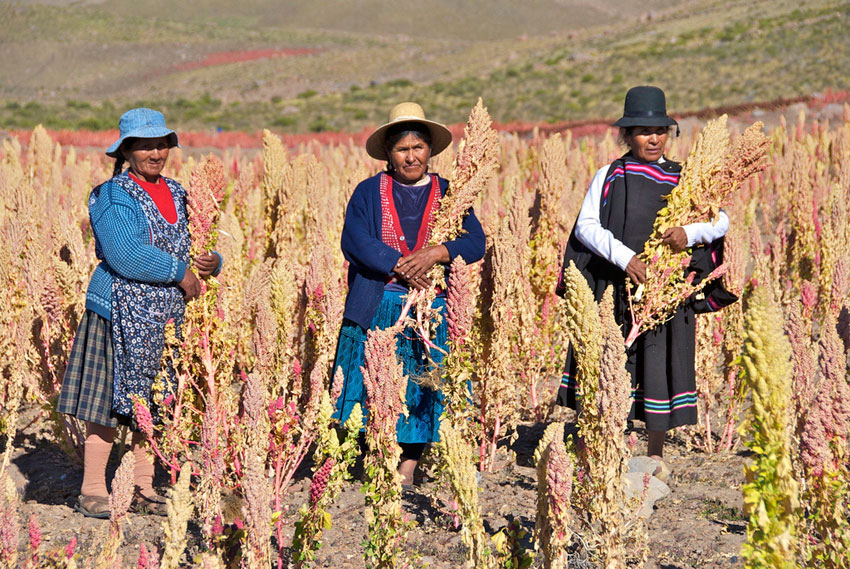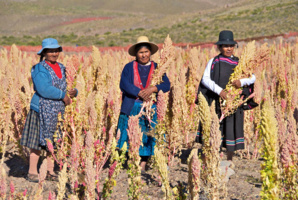Thanks to the success of a school’s meal program, which serves healthy breakfast and lunch to its students, has opened the eyes of Bolivian officials towards promoting healthy locals nutrition based on local traditions, which not only food promote food sovereignty but combats malnutrition as well. Bolivia has now passed a law that aims to promote and preserve its local dietary traditions.
During a local visit to the Unidad Educativa La Paz school by local officials saw students saying, “We want fruit on Wednesdays!” in response to their suggestions for improvement of their diet, a national programme which is part and parcel of the Complementary School Food Unit (ACE). A demand of this nature from youngsters, for healthy food, would be unthinkable a few years ago.
In La Paz, the model for the ACE food programme, began in 2000 and gradually bloomed into an innovative and nutritive programme that supports local-growers of fruits and vegetables for children and adolescents studying in public schools. The success of the program was such, that it even got recognised by the Food and Agriculture Organisation (FAO) as well as the United Nations World Food Program (WFP) and both have praised its efforts and results in many of its reports.
“We are leaders in producing school meals with Andean foods like amaranth, fava bean flour and quinoa,” said Jorge Gómez, La Paz’s Director of Education. The ACE program provides meals to school going children between the growing ages of 5 and 15. The diet is made up of quinoa grains and high-protein amaranth, which is typically pre-Columbian and is particular to South America’s Andean region.
As per independent studies conducted jointly by the Mayor of San Andrés University along with Save the Children, an international organisation, this dietary initiative has thrown up many positive results. During the 1st eight years, anemia in school going children fell by 30%, which is high figure considering the lack of economic penetration in the region which has historically led to malnutrition and poverty.
Tasting success, ACE, which was essentially meant for primary students, as as of 2005, further expanded so as reach secondary public schools, nationwide, as well. And according to the Ministry of Education, in 2013 million students were the recipients of this program. ACE not only provided healthy nutrition and nutritional habits to students but gave a huge economic boost to community agriculture as well.
And in December 2014, it gave rise to a “law on school meals in the framework of food sovereignty and a plural economy ”. This law bans packaged and transgenic food in schools and stipulates that these be replaced by more traditional Andean alternatives, which naturally can be grown and produced locally.
A big boost for local farmer
The ACE programme has given rise to a big demand for natural home grown fruits and vegetables which in turn has acted as a boom for the local farmers who produce bananas and other local variety of fruits, Andean grains, etc. These farmers have now become more organised and have grouped themselves into cooperatives and companies.
Throughout the day, around 26 tons of food and beverages do their rounds – from the farms and productions centres located in the highlands at a height of more than 4000 metres to the valleys below wherein schools are typically located. The ACE program has thus not only helped the health of the children but has also contributed to the health of the local food industry as well.
These local positive impacts have been cooped up and have helped formulate a national law by the success of this model can be replicated elsewhere benefiting both the health of the local populace as well as that of the economy.
References:
http://www.ipsnews.net/2015/03/bolivias-school-meals-all-about-good-habits-and-eating-local/
During a local visit to the Unidad Educativa La Paz school by local officials saw students saying, “We want fruit on Wednesdays!” in response to their suggestions for improvement of their diet, a national programme which is part and parcel of the Complementary School Food Unit (ACE). A demand of this nature from youngsters, for healthy food, would be unthinkable a few years ago.
In La Paz, the model for the ACE food programme, began in 2000 and gradually bloomed into an innovative and nutritive programme that supports local-growers of fruits and vegetables for children and adolescents studying in public schools. The success of the program was such, that it even got recognised by the Food and Agriculture Organisation (FAO) as well as the United Nations World Food Program (WFP) and both have praised its efforts and results in many of its reports.
“We are leaders in producing school meals with Andean foods like amaranth, fava bean flour and quinoa,” said Jorge Gómez, La Paz’s Director of Education. The ACE program provides meals to school going children between the growing ages of 5 and 15. The diet is made up of quinoa grains and high-protein amaranth, which is typically pre-Columbian and is particular to South America’s Andean region.
As per independent studies conducted jointly by the Mayor of San Andrés University along with Save the Children, an international organisation, this dietary initiative has thrown up many positive results. During the 1st eight years, anemia in school going children fell by 30%, which is high figure considering the lack of economic penetration in the region which has historically led to malnutrition and poverty.
Tasting success, ACE, which was essentially meant for primary students, as as of 2005, further expanded so as reach secondary public schools, nationwide, as well. And according to the Ministry of Education, in 2013 million students were the recipients of this program. ACE not only provided healthy nutrition and nutritional habits to students but gave a huge economic boost to community agriculture as well.
And in December 2014, it gave rise to a “law on school meals in the framework of food sovereignty and a plural economy ”. This law bans packaged and transgenic food in schools and stipulates that these be replaced by more traditional Andean alternatives, which naturally can be grown and produced locally.
A big boost for local farmer
The ACE programme has given rise to a big demand for natural home grown fruits and vegetables which in turn has acted as a boom for the local farmers who produce bananas and other local variety of fruits, Andean grains, etc. These farmers have now become more organised and have grouped themselves into cooperatives and companies.
Throughout the day, around 26 tons of food and beverages do their rounds – from the farms and productions centres located in the highlands at a height of more than 4000 metres to the valleys below wherein schools are typically located. The ACE program has thus not only helped the health of the children but has also contributed to the health of the local food industry as well.
These local positive impacts have been cooped up and have helped formulate a national law by the success of this model can be replicated elsewhere benefiting both the health of the local populace as well as that of the economy.
References:
http://www.ipsnews.net/2015/03/bolivias-school-meals-all-about-good-habits-and-eating-local/






